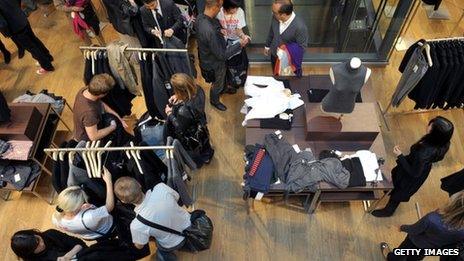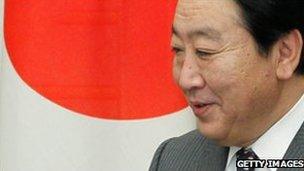Sales tax hike is a bitter pill Japan needs to swallow
- Published

Critics say the sales tax hike could slow consumer spending significantly
The issue of a consumption tax rate hike has been at the top of the agenda of Yoshihiko Noda, Japan's Prime Minister and the leader of the ruling Democratic Party of Japan (DPJ), since he rose to his current position in September 2011.
The DJP is expected to submit a bill by the end of March to increase Japan's sales tax rate from the current 5% to 8% in 2014 and then to 10% in 2015.
A rise in the tax will help narrow Japan's fiscal deficit, currently as large as 44tn yen ($532.1bn; £332.9bn) in the financial year ending in 2012 and equivalent to 8.9% of Japan's gross domestic product (GDP).
A one percentage point rise in the tax rate is expected to bring in tax revenues of 2tn yen.
While the consumption tax rate hike alone will not solve Japan's fiscal problems, it could substantially improve Japan's fiscal balance.
Alternatives
While there are other taxes that can be raised, consumption tax is considered to be one of the most appropriate in Japan's circumstances.

A consumption tax rate hike has been at the top of the agenda of Prime Minister Yoshihiko Noda
Personal income tax has formed the backbone of tax revenues in Japan.
However the decline of Japan's working population has been eroding its tax base.
The ratio of working population to total population has declined from 65% in the early 1970s to 59% in 2011.
As the share of pensioners with financial assets but low incomes rise in Japan, consumption, rather than income is becoming a better measure for tax base.
Major hurdles
It is far from certain if the Japanese government can actually raise the sales tax rate in 2014.
There are two major hurdles.
Firstly, there is a possibility that Prime Minister Noda may fail to pass the bill.
The issue of consumption tax rate hike has been a source of serious divide within the DPJ.
Nine parliamentary members of the DPJ left the party last December when Mr Noda formally proposed raising consumption tax.
More members are threatening to oppose the bill or leave the party, including a former party head, Ichiro Ozawa.
While the DPJ currently holds a majority in the lower house, if he allows further defections from the party its majority will come under threat.
Secondly, and much more importantly, economic circumstances may not allow a consumption tax rate hike in 2014.
Even if Mr Noda succeeds in gathering enough votes to pass the bill this year, the Japanese parliament could overturn the decision before 2014.
The bill that the DPJ is expected to propose is likely to include certain conditions, such as a risk of recession, under which the tax hike can be postponed.
When the consumption tax rate was last raised in 1997 from 3% to 5%, Japan fell into a deep recession culminating in a financial crisis that saw failures of a few of Japan's largest banks.
Although it's probable that the financial crisis would have taken place even without the consumption tax hike, it no doubt contributed to it.
Fear of recession
Indeed, if the Japanese government is to proceed with the tax hike in 2014, we believe it will trigger another recession.
Judging from the current trend in the economic cycle, the Japanese economy is expected to experience a boom between 2012-2013.
The Japanese government passed a total of four supplementary budgets in 2011, totalling 20tn yen and equivalent to 4% of GDP.
Due to the difficulty of cleaning up the disaster affected areas from the earthquake and tsunami last March, the bulk of the reconstruction projects are yet to be implemented.
We think Japanese economic growth will receive a substantial boost from reconstruction spending, as much as 1.9 percentage points in 2012.
As a result, we expect Japan's economy to grow by 2.4% in 2012, followed by a 2% growth in 2013.
However towards the end of 2013, the economic boom from reconstruction spending is likely to be reaching its end.
Under such circumstances, the chances are high that the consumption tax rate would again trigger a recession.
Should the Japanese government abandon the sales tax hike plan then?
It is a tough call.
Ideally, the best timing for the tax rate would have been in either 2012 or early 2013 so that the negative economic effects from the hike could have been offset by the positive effects from the reconstruction spending.
Having said that, policy making has to be done within various constraints including political ones.
In our view, while a consumption tax hike in 2014 will probably cause a recession, it is a bitter pill that Japan needs to swallow.
The opinions expressed are those of the author and are not held by the BBC unless specifically stated. The material is for general information only and does not constitute investment, tax, legal or other form of advice. You should not rely on this information to make (or refrain from making) any decisions. Links to external sites are for information only and do not constitute endorsement. Always obtain independent, professional advice for your own particular situation.